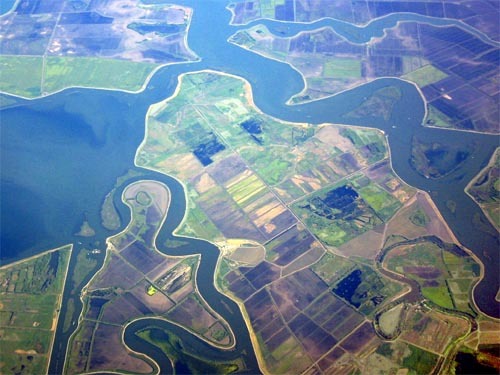In Dostoevsky’s “The Brothers Karamazov,” a priest recalls the words of a man who confessed, “The more I love mankind in general, the less I love people in particular.” We can all think of people like that—folks of varied political persuasions who rally to “save” humanity but become so consumed by their cause that they lose patience with the individuals they ostensibly are trying to help.
Judging by Gov. Jerry Brown’s latest plan to “save” California’s Sacramento-San Joaquin Delta, he appears to suffer from a variant of the same condition. California’s Green Governor loves the Earth in general but he doesn’t seem to care about particular earthly environments.
Throughout his political career, Brown has championed grand Earth-saving projects such as AB 32, the state’s first-in-the nation cap-and-trade system designed to prod the world into cutting the carbon dioxide emissions that supposedly lead to global warming. He is pushing a high-speed-rail system that is designed to lure people out of their automobiles. He speaks often about his commitment to the environment.
Yet I wonder whether the governor has ever taken the short trip from the Capitol to one of California’s ecological treasures. As it comes down from the mountains and heads toward the San Francisco Bay, the bulk of the state’s water passes through the Delta. It is a land of marshes, islands, charming small towns, Victorian mansions, and orchards interspersed between 1,000 miles of waterways.
Water Diversions Kill Smelt
The Delta also is Ground Zero for ongoing fights over the state’s water supplies. Judges have routinely stopped the water flows out of the Delta toward the dry but agriculturally rich San Joaquin Valley and toward Southern California’s massive metropolises, to help a tiny endangered baitfish known as the Delta Smelt. The smelt is viewed as the canary in a coal mine, a bellwether for the ecological health of the waterways.
Millions of smelt are killed each year as they get caught in the giant pumps near Tracy, near the south end of the Delta. Environmentalists also express concerns about the level of saltwater that moves inland from the Pacific Ocean.
This tiny, tranquil region is about to undergo dramatic, government-imposed changes that threaten its beauty and way of life. The governor’s plan is touted by Southern California water agencies and farmers alike, who view it as a means to assure more consistent water supplies.
I’m a believer in providing water to thirsty farmers and thirsty cities. But the Bay Delta Conservation Plan won’t necessarily increase the flow of water, according to the first parts of the plan, which recently has been released to the public.
The plan would start a decade-long construction project to build two massive tunnels to bypass the current river system. At a cost estimated as high as $39 billion before the usual government-project overruns, the tunnels would move water supplies under the Delta and thereby decrease the current reliance on aging, earthquake-prone levees.
Regulatory Problem
The plan has two equal goals: restore the Delta ecosystem and improve water reliability. It won’t increase water flows, but by resolving the Delta Smelt issue it will end the court-ordered water stoppages—at least in theory. Thus the administration is proposing the use of tax dollars and massive engineering feats to solve a legal and regulatory problem. This is a poor use of resources, especially in a state that is largely broke and already faces some of the biggest debt and tax burdens in the nation.
What are the chances that once the smelt issue is fixed, environmentalists won’t find another reason to sue to stop the water flows given that the water flows are the real source of the dispute?
The administration’s plan will tear up the Delta for at least 10 years. We know how government infrastructure projects are always delayed, so it’s anyone’s guess how long it actually will take. Even the project’s advocates admit they aren’t sure about the unintended consequences.
As part of its ecosystem restoration program, this boondoggle will flood a large portion of the Delta’s land, destroying vineyards, farmland, orchards, and marshes. It will submerge islands. There will be land confiscations.
Environmental groups say the reengineering of the ecosystem will destroy salmon and other fish habitats. No one in their right mind would hand over a precious region such as this to bureaucrats, but in Sacramento these days the Brown administration is trying to relive the glory days of the New Deal where central planning and big spending were the in thing.
Free Marketers, Environmentalists Aligned
This is a case where free-market advocates such as myself and true environmentalists should make common cause—to stop a misguided project that will raise water rates and increase the state’s debt load to provide limited and questionable gains. There are better, cheaper, more reasonable ways to increase water supplies, tend to a damaged ecosystem, and shore up levees.
I don’t expect this governor to worry much about deficit spending, tax burdens, and that sort of thing. But perhaps he might take a trip through the meandering waterways and charming small towns of the Delta where he can learn one shouldn’t save the environment in general by sacrificing an environment in the process.
Steven Greenhut ([email protected]) is vice president of journalism at the Franklin Center for Government and Public Integrity. Used with permission of Watchdog.org.






